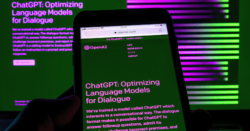Unlocking Potential: Navigating ChatGPT
In the swiftly advancing realm of artificial intelligence, ChatGPT stands out as a pioneering language model designed to redefine human-computer interactions. Unlike the apocalyptic visions of AI embodied by Arnold Schwarzenegger as the Terminator, ChatGPT represents a leap forward in conversational AI.
Developed by OpenAI, ChatGPT harnesses the capabilities of deep learning and natural language processing to offer users an intuitive and conversational AI experience. Having explored ChatGPT extensively, it’s fascinating to witness how rapidly it adapts to human language and its evolving utility in various daily activities.
While ChatGPT boasts its merits, it’s essential to tread cautiously due to its unregulated nature, raising concerns about potential plagiarism issues. Notably, a defamation lawsuit against OpenAI LLC surfaced on June 5th, 2023, underlining the need to use ChatGPT judiciously.

What is ChatGPT?
ChatGPT is an advanced language model that employs deep learning techniques to generate human-like responses in natural language conversations. Rooted in the GPT (Generative Pre-trained Transformer) architecture, ChatGPT undergoes training on an extensive corpus of text data, enabling it to comprehend and generate coherent responses to various prompts and queries.
Is ChatGPT Safe to Use?
OpenAI has made strides in addressing concerns about harmful or biased outputs from ChatGPT. Despite efforts to provide accurate information, occasional inaccuracies or misleading responses may occur, as evidenced by the defamation lawsuit. OpenAI encourages user feedback to refine the system and mitigate potential issues, incorporating mechanisms such as likes or dislikes on responses.
ChatGPT is deemed technically “safe” to use, but caution is advised in its utilization. While employing it for tasks like identifying target audiences and structuring sentences, its unregulated nature raises concerns. Notably, using ChatGPT for academic purposes has led to complications, with students facing accusations of AI-assisted plagiarism.
How Does ChatGPT Acquire Information?
ChatGPT acquires knowledge through pre-training on a vast repository of publicly available text data from the internet. This extensive training helps the model develop a broad understanding of language and general knowledge. However, it’s crucial to note that ChatGPT lacks real-time access to information or specific databases, relying on patterns and information learned during training.
How is ChatGPT Helping People Right Now?
ChatGPT has emerged as a potent tool, revolutionizing various facets of daily human life. Its applications span customer service, content generation, tutoring, creative writing, and more. By automating routine tasks and delivering swift, mostly accurate responses, ChatGPT enhances efficiency, allowing individuals and businesses to focus on more intricate and strategic endeavors.

Applications for ChatGPT
Customer Support
Companies leverage ChatGPT to enhance customer support services, address queries, guide users through troubleshooting, and provide personalized recommendations. The beta version serves as a chatbot on websites, offering interactive support.
Content Generation
Content creators benefit from ChatGPT’s ability to generate coherent text, aiding in brainstorming ideas, suggesting writing approaches, and expediting content creation. However, caution is advised to avoid potential issues of content duplication.
Language Learning and Tutoring
ChatGPT serves as a virtual language tutor, engaging learners with interactive conversations, grammar explanations, and vocabulary assistance, making language learning more accessible.
Personal Assistant
With its conversational prowess, ChatGPT acts as a digital personal assistant, aiding in scheduling appointments, answering questions, providing recommendations, and engaging in casual conversations.
While ChatGPT holds immense potential, its effectiveness hinges on how questions are framed. It proves valuable in tasks like discovering new marketing audiences and crafting content examples with different tones.
ChatGPT-4 vs. ChatGPT-3
ChatGPT-4, released on March 12, 2023, introduces a paid subscription version for enhanced usage. It is a more sophisticated version of GPT-3, delivering more human-like responses, better understanding user requests, and adeptly handling dialects and cultural variations.
In conclusion, ChatGPT, with its transformative capabilities, presents a shift in AI. Its seamless integration into various domains signifies a future where AI plays a pivotal role in shaping our daily activities. As ChatGPT continues its evolutionary journey, users must approach its usage with discernment, unlocking its vast potential while being mindful of potential pitfalls. The ongoing advancements in AI and ChatGPT pave the way for a dynamic and interconnected digital landscape.
For businesses and individuals seeking expert guidance on navigating the transformative realm of AI, PushCrankPress stands ready to assist. Contact us today to harness the power of AI and propel your business into the future. The collaboration of ChatGPT and PushCrankPress ensures that you stay at the forefront of innovation, making your journey into the world of AI both enlightening and successful.
Posted: May 03, 2024
